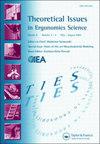Perceived stress among information technology professionals in India during the COVID-19 pandemic
IF 1.4
Q4 ERGONOMICS
引用次数: 4
Abstract
Abstract The Information Technology (IT) industry in India is an integral part of the nation’s economy. The COVID-19 pandemic is a cause of disquietude and is probably the gravest challenge encountered by the IT industry at present. Although the IT industry has contributed to varied sectors globally amid the crisis, IT professionals encounter a profusion of mental health challenges. Despite this, there have as yet been limited studies focusing on the mental health impact on IT professionals during this period. This study strives to explore the role of socio-demographic factors on perceived stress and to examine the association between gratitude and perceived stress among IT professionals in India during the pandemic. Data from 219 participants were included for analysis in this cross-sectional, correlational study. Findings suggest that there exists a significant difference in perceived stress based on gender, marital status, and parental status. Furthermore, the results demonstrate a significant negative association between gratitude and perceived stress. The study contributes to the field of cognitive ergonomics and broadens the theoretical knowledge base of perceived stress based on socio-demographic elements. Findings also have positive implications for organisational psychologists as they suggest that encouraging a focus on gratitude could aid in lower perceived stress.2019冠状病毒病大流行期间印度信息技术专业人员感受到的压力
印度信息技术(IT)产业是印度国民经济的重要组成部分。新冠肺炎疫情令人不安,可能是当前IT行业面临的最严峻挑战。虽然IT行业在危机中为全球各个部门做出了贡献,但IT专业人员面临着大量的心理健康挑战。尽管如此,迄今为止,关注这一时期IT专业人员心理健康影响的研究有限。本研究旨在探讨社会人口因素对感知压力的作用,并研究大流行期间印度IT专业人员的感恩与感知压力之间的关系。来自219名参与者的数据被纳入这项横断面相关研究进行分析。研究结果表明,性别、婚姻状况和父母状况对压力感知存在显著差异。此外,结果表明感恩与感知压力之间存在显著的负相关。该研究为认知工效学领域做出了贡献,拓宽了基于社会人口学因素的感知压力的理论知识基础。研究结果对组织心理学家也有积极的影响,因为他们表明,鼓励人们关注感恩,有助于降低感知压力。
本文章由计算机程序翻译,如有差异,请以英文原文为准。
求助全文
约1分钟内获得全文
求助全文

 求助内容:
求助内容: 应助结果提醒方式:
应助结果提醒方式:


